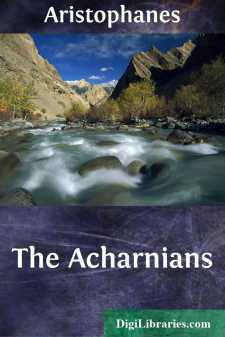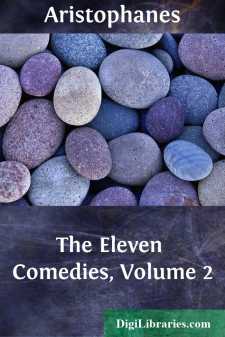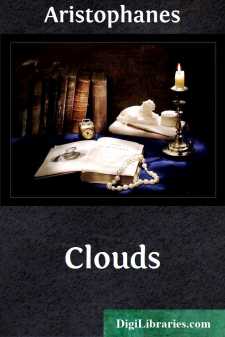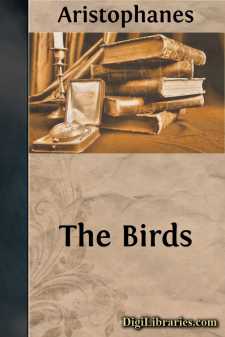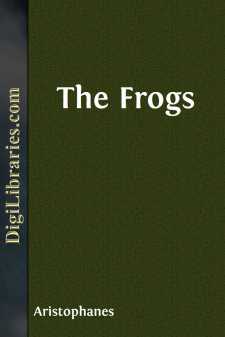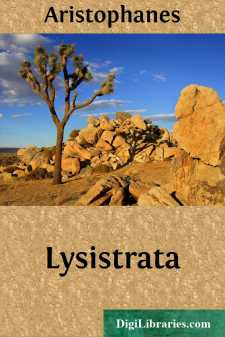Categories
- Antiques & Collectibles 13
- Architecture 36
- Art 48
- Bibles 22
- Biography & Autobiography 813
- Body, Mind & Spirit 142
- Business & Economics 28
- Children's Books 15
- Children's Fiction 12
- Computers 4
- Cooking 94
- Crafts & Hobbies 4
- Drama 346
- Education 46
- Family & Relationships 57
- Fiction 11828
- Games 19
- Gardening 17
- Health & Fitness 34
- History 1377
- House & Home 1
- Humor 147
- Juvenile Fiction 1873
- Juvenile Nonfiction 202
- Language Arts & Disciplines 88
- Law 16
- Literary Collections 686
- Literary Criticism 179
- Mathematics 13
- Medical 41
- Music 40
- Nature 179
- Non-Classifiable 1768
- Performing Arts 7
- Periodicals 1453
- Philosophy 64
- Photography 2
- Poetry 896
- Political Science 203
- Psychology 42
- Reference 154
- Religion 513
- Science 126
- Self-Help 84
- Social Science 81
- Sports & Recreation 34
- Study Aids 3
- Technology & Engineering 59
- Transportation 23
- Travel 463
- True Crime 29
The Acharnians
by: Aristophanes
Categories:
Description:
Excerpt
INTRODUCTION
This is the first of the series of three Comedies—'The Acharnians,' 'Peace' and 'Lysistrata'—produced at intervals of years, the sixth, tenth and twenty-first of the Peloponnesian War, and impressing on the Athenian people the miseries and disasters due to it and to the scoundrels who by their selfish and reckless policy had provoked it, the consequent ruin of industry and, above all, agriculture, and the urgency of asking Peace. In date it is the earliest play brought out by the author in his own name and his first work of serious importance. It was acted at the Lenaean Festival, in January, 426 B.C., and gained the first prize, Cratinus being second.
Its diatribes against the War and fierce criticism of the general policy of the War party so enraged Cleon that, as already mentioned, he endeavoured to ruin the author, who in 'The Knights' retorted by a direct and savage personal attack on the leader of the democracy.
The plot is of the simplest. Dicaeopolis, an Athenian citizen, but a native of Acharnae, one of the agricultural demes and one which had especially suffered in the Lacedaemonian invasions, sick and tired of the ill-success and miseries of the War, makes up his mind, if he fails to induce the people to adopt his policy of "peace at any price," to conclude a private and particular peace of his own to cover himself, his family, and his estate. The Athenians, momentarily elated by victory and over-persuaded by the demagogues of the day—Cleon and his henchmen, refuse to hear of such a thing as coming to terms. Accordingly Dicaeopolis dispatches an envoy to Sparta on his own account, who comes back presently with a selection of specimen treaties in his pocket. The old man tastes and tries, special terms are arranged, and the play concludes with a riotous and uproarious rustic feast in honour of the blessings of Peace and Plenty.
Incidentally excellent fun is poked at Euripides and his dramatic methods, which supply matter for so much witty badinage in several others of our author's pieces.
Other specially comic incidents are: the scene where the two young daughters of the famished Megarian are sold in the market at Athens as suck(l)ing-pigs—a scene in which the convenient similarity of the Greek words signifying a pig and the 'pudendum muliebre' respectively is utilized in a whole string of ingenious and suggestive 'double entendres' and ludicrous jokes; another where the Informer, or Market-Spy, is packed up in a crate as crockery and carried off home by the Boeotian buyer.
The drama takes its title from the Chorus, composed of old men of Acharnae.
THE ACHARNIANS
DRAMATIS PERSONAEDICAEOPOLIS
HERALD
AMPHITHEUS
AMBASSADORS
PSEUDARTABAS
THEORUS
WIFE OF DICAEOPOLIS
DAUGHTER OF DICAEOPOLIS
EURIPIDES
CEPHISOPHON, servant of Euripides
LAMACHUS
ATTENDANT OF LAMACHUS
A MEGARIAN
MAIDENS, daughters of the Megarian
A BOEOTIAN
NICARCHUS
A HUSBANDMAN
A BRIDESMAID
AN INFORMER
MESSENGERS
CHORUS OF ACHARNIAN ELDERS
SCENE: The Athenian Ecclesia on the Pnyx; afterwards Dicaeopolis' house in the country.


